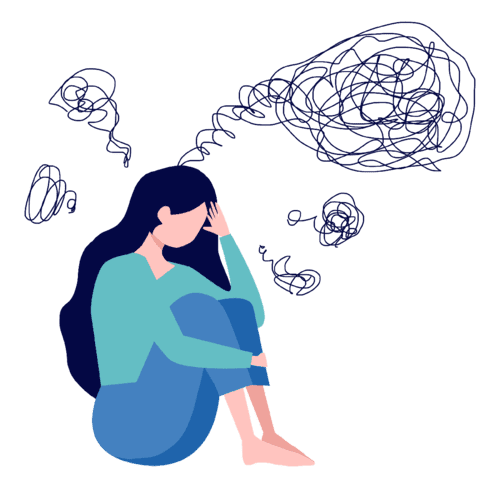Emotional OCD Assessment
Free Emotional OCD Assessment

What is Emotional OCD Assessment?
Emotional OCD assessment involves evaluating an individual’s emotional responses and thought patterns to identify potential symptoms of Obsessive-Compulsive Disorder (OCD) that are primarily centered around intense and distressing emotions. This assessment aims to determine if a person’s obsessions and compulsions primarily revolve around emotional distress rather than specific external triggers. It includes analyzing the degree to which emotions drive compulsive behaviors and intrusive thoughts, helping mental health professionals diagnose and tailor treatment for Emotional OCD, a subtype of OCD characterized by emotional themes like guilt, shame, or uncertainty, rather than solely external stimuli.
Who can benefit from this Emotional OCD Assessment?
The Emotional OCD Assessment can benefit individuals who experience intrusive and distressing thoughts or obsessions, coupled with compulsive behaviors aimed at reducing anxiety. This assessment is suitable for those seeking to understand if their emotional experiences align with OCD patterns, providing clarity on whether their struggles relate to the disorder. By evaluating the intensity, frequency, and impact of these thoughts and behaviors, the assessment aids in identifying potential OCD symptoms. However, a conclusive diagnosis and appropriate treatment should be sought from qualified mental health professionals, who can tailor interventions based on an individual’s unique needs and circumstances.
Emotional OCD Assessment Accuracy
Emotional OCD assessments aim to evaluate the severity and impact of obsessive-compulsive disorder related to emotions. While these assessments can provide valuable insights, their accuracy depends on various factors, including the thoroughness of the assessment tool, the individual’s willingness to be honest, and the experience of the assessor. However, only a trained mental health professional can provide a definitive diagnosis and accurate assessment. Self-assessments can offer a general idea, but a comprehensive evaluation by a qualified therapist or psychiatrist remains crucial for accurate diagnosis and effective treatment planning.
Types of Emotional OCD Assessment
Obsession Assessment:
This involves identifying the intrusive and distressing thoughts, images, or urges that the individual experiences. These obsessions can cover a wide range of themes, including contamination, harm, religious or moral concerns, relationships, and more.
Compulsion Assessment:
Determine the mental rituals or compulsive behaviors that the individual engages in to alleviate the distress caused by their obsessions. These compulsions might include mental reviewing, analyzing, seeking reassurance from others, avoiding triggers, or distracting oneself.
Impact Assessment:
Evaluate how Emotional OCD is impacting the individual’s daily functioning, relationships, and overall quality of life. This might involve assessing areas such as work, social interactions, personal relationships, and leisure activities.
Duration and Frequency Assessment:
Determine how often the obsessions and compulsions occur and how much time the individual spends engaging in these activities. This can help gauge the severity of the condition.
Severity Rating Scales:
Mental health professionals might use standardized rating scales to quantify the severity of the individual’s symptoms and track their progress over time. Examples include the Yale-Brown Obsessive-Compulsive Scale (Y-BOCS) and the Obsessive-Compulsive Inventory-Revised (OCI-R).
Functional Impairment Assessment:
Assess the extent to which the individual’s emotional obsessions and compulsions are interfering with their ability to perform everyday tasks and pursue their goals.
Handling Emotional OCD
Emotional OCD, also known as Pure-O OCD, is a subtype of Obsessive-Compulsive Disorder (OCD) where the obsessions primarily involve intrusive, distressing thoughts or images. Unlike traditional OCD, the compulsive behaviors might be mental rituals like analyzing, reassurance seeking, or avoidance. Here are some strategies that might help in handling emotional OCD:
- Practice Mindfulness: Mindfulness techniques can help you observe your thoughts and emotions without judgment. This can create a sense of distance from the distressing thoughts and reduce their impact on your emotions.
- Challenge Negative Thoughts: Cognitive restructuring involves challenging the accuracy and validity of your distressing thoughts. Ask yourself if there’s concrete evidence for your fears and consider alternative, more balanced perspectives.
- Exposure and Response Prevention (ERP): This is a cornerstone of OCD treatment. With emotional OCD, you expose yourself to the distressing thoughts without engaging in compulsions (mental or physical). This helps you learn that you can tolerate the discomfort and that the thoughts won’t harm you.
- Set Aside Worry Time: Allocate a specific time each day to address your worries and obsessions. When intrusive thoughts arise outside of this time, remind yourself that you’ll address them during your designated worry time.
- Limit Reassurance Seeking: Seeking reassurance can provide temporary relief but reinforces the cycle of OCD. Try to resist the urge to ask for reassurance from others or to reassure yourself repeatedly.
- Journaling: Keep a journal to document your obsessive thoughts and emotions. This can help you identify patterns and triggers, making it easier to address them.
- Practice Acceptance: Accept that you might experience uncomfortable thoughts and emotions, and that they don’t define you. Instead of struggling against them, practice letting them be present without engaging in compulsive behaviors.
- Mindful Breathing: When intrusive thoughts arise, practice deep breathing to ground yourself in the present moment. Focusing on your breath can help you redirect your attention away from the distressing thoughts.
- Seek Professional Help: Consulting a therapist who specializes in OCD, particularly emotional OCD, can provide you with tailored strategies and support.
- Support System: Share your experiences with trusted friends or family members who can provide encouragement and understanding.
- Self-Compassion: Treat yourself with kindness and self-compassion. OCD can be incredibly distressing, and it’s important to be gentle with yourself as you work through it.
- Medication: If emotional OCD is significantly impacting your daily life, medication might be considered as part of your treatment plan. Consult a psychiatrist for guidance.
Remember that progress might be gradual, and setbacks can happen. It’s important to persistently apply these strategies and consider seeking professional guidance to ensure you’re using the most effective methods for managing your emotional OCD.

